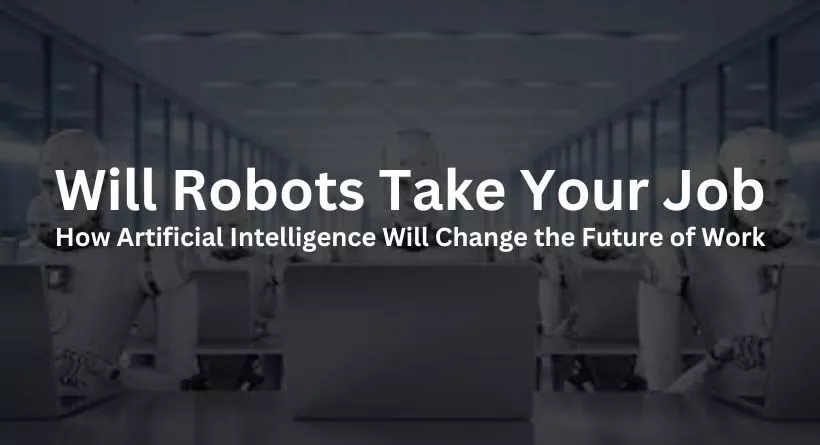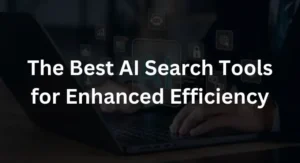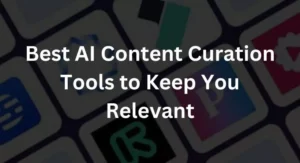
In today’s rapidly evolving world, the integration of artificial intelligence (AI) has become an integral part of almost every aspect of our lives. AI is no longer confined to science fiction; it is actively reshaping the workplace, both in the physical world and the digital realm. This article delves into the significant impact AI is having on the present and the potential it holds for the future, discussing its implications, both positive and negative.
The Current State of AI in the Workplace

When you think of AI, you might picture futuristic robots attending to our every need. While that vision may not be too far from reality, the current applications of AI are already widespread. AI plays a role in various facets of our professional lives, including:
You may also like reading: How Is Artificial Intelligence Shaping the Future of Work?
Resume Screening
The job application process often begins with AI, which screens resumes to match the most suitable candidates for a position.
Voice Assistants
Popular voice assistants like Alexa, Google Assistant, and Siri rely on AI to perform various tasks and answer questions.
Internet Search Engines
AI is behind the search engines you use daily, helping you find the information you need quickly.
Vehicle Safety
AI is making vehicles safer by detecting drowsy drivers and preventing accidents.
Manufacturing
Manufacturers utilize AI to streamline production processes and improve product quality.
Medicine
In the medical field, AI can diagnose diseases and even locate tumours more accurately than human radiologists.
Web3 and the Metaverse
The future of work may extend into the metaverse, where companies are already conducting meetings, and the integration of AI in this digital space is expected to grow.
The Future of AI in the Workplace
One of the pressing questions regarding artificial intelligence (AI) is whether it will replace human jobs entirely. Experts concur that while AI will automate repetitive tasks, human involvement in the workforce remains essential. AI’s role will shift towards enhancing human creativity and innovation.
The Evolution of Work
Robb Wilson, an AI researcher, and author of “Age of Invisible Machines” predicts that as mundane tasks become increasingly automated, people will have more time for creative problem-solving. This will necessitate a significant shift in our perception of work and its value.
Restructuring the Workweek
The traditional 40-hour workweek may become obsolete, replaced by a more flexible, collaborative, and technology-driven approach to work.
Industries AI Will Transform

AI’s influence already spans various sectors, but its future applications are poised to revolutionize even more industries:
Healthcare
AI will improve early disease diagnosis and treatment, and it will create personalized preventative care plans.
Service Industry
Robots and AI-powered machines may take over roles in customer service, cashier positions, and even cooking in fast-food restaurants.
Law Enforcement
AI-driven facial recognition systems can enhance law enforcement efforts, and AI-run robots are already employed for security.
Online Security
AI will play a critical role in detecting online fraud and safeguarding consumer data.
Transportation
Autonomous vehicles will become more prevalent, potentially eliminating the need for human drivers in taxis and other forms of transportation.
Marketing
AI will create targeted advertisements and even generate articles, offering more efficient and personalized marketing approaches.
Pros of AI in the Workplace
The adoption of AI in the workplace offers several advantages, with one of the most significant being the automation of repetitive and undesirable tasks. This not only makes work more manageable but also increases productivity and efficiency.
AI can enhance the customer experience, adapt to changing market conditions, expedite product development, and create a more conducive working environment.
Furthermore, AI’s expansion in the job market will not only displace some roles but also create new, often higher-paying positions. However, these new roles may require advanced training, which could pose challenges for some individuals.
Cons of AI in the Workplace
While AI’s future is promising, several concerns exist:
AI Bias
AI systems can inherit and propagate human biases, leading to discriminatory outcomes in areas such as job recruitment. Legislation is being introduced to hold companies accountable for biased AI systems.
Environmental Impact
AI’s development and training require substantial computing power, resulting in significant energy consumption and carbon emissions. Efforts are needed to mitigate its environmental impact.
Lack of Emotional Intelligence
AI lacks the emotional intelligence that humans possess, which can limit its effectiveness in tasks that require complex emotions, empathy, and creativity.
The Future of AI
Despite its challenges, AI is here to stay. Careful monitoring and regulation are necessary to ensure its ethical and eco-friendly progression. As AI continues to evolve, it will bring about changes in various aspects of our lives, including real estate in the metaverse, the future of virtual reality, and the growing importance of NFTs.
Conclusion
AI is not just a buzzword; it’s a game-changer. It is reshaping our workplaces, offering new opportunities, but also raising challenges that need to be addressed. As we navigate this evolving landscape, it’s crucial to embrace the potential of AI while ensuring its responsible and ethical application.
FAQs
1. Will AI completely replace human jobs?
No, AI is more likely to automate mundane tasks, allowing humans to focus on creative problem-solving and innovation.
2. What industries will AI impact the most?
AI is already influencing healthcare, service industries, law enforcement, online security, transportation, and marketing, but its impact is expected to extend to many more sectors.
3. What are the environmental concerns associated with AI?
AI’s energy-intensive training processes can have a significant environmental impact, leading to carbon emissions and increased energy consumption.
4. Can AI have biases?
Yes, AI systems can inherit and propagate human biases, which can lead to unfair and discriminatory outcomes, especially in areas like job recruitment.
5. What role will humans play in a world with AI?
Humans will continue to be essential in the workforce, focusing on tasks that require creativity, empathy, and complex problem-solving, while AI handles repetitive and data-intensive work.





